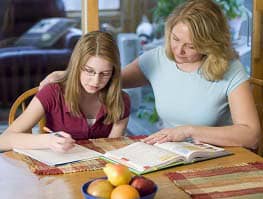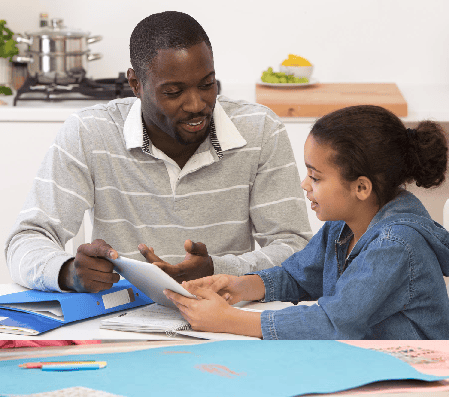What is Homeschooling Like? A Real Interview with a Homeschooling Mama

|
Getting your Trinity Audio player ready...
|
I conducted the following interview in October 2014, with Linda Warren, a really sweet mom from Alabama.
She shared a lot about her personal experiences homeschooling her daughter.
See what Linda had to say below:
Interview with a Homeschooling Mom from Alabama
1. How long have you been homeschooling?
We have been homeschooling since January 2007, so approaching 8 years. My daughter is currently in ninth grade. We started homeschooling in the middle of first grade.
You May Also Like: What Does the Research Say About the Impact of Homeschooling on Academic Performance and Social Skills2. How did you end up homeschooling?
Kindergarten, in public school, was rough for my daughter. It took until after spring break for her to become engaged in learning. When I worked with her at home, she excelled.
She was engaged. Over the summer I taught her and she caught up on everything from kindergarten. Once first grade started, she felt bored, had low self-esteem, and acted out.
She felt horrible and once stated, ” they must think I am the stupidest kid on the planet and I should just die.” Those are heartbreaking words to hear from a 6-year old.

I talked to the teacher and tried to get them to let her do some more challenging work, but the school told me that they would not let her do any advanced work because she was emotionally immature.
Additionally, my daughter was sick with every respiratory and intestinal illness that came down the pike and missed a lot of days of school. Her behavior in school was on a steady downhill slide. By November they told me they would suspend her or find other ways to punish her.
We had also been reported for missing too many days of school (because of illness).
There were several other incidents that pushed me toward homeschooling, including two school lock-downs, a bullying incident that required a doctor’s visit by my daughter, and an increased belief that my daughter was ADHD. I just felt like this was a no-win situation, and turned to the thing I never thought I would, homeschooling.
3. How has your homeschooling experience been?
Homeschooling has been great for my daughter and me. We tailor-make her educational experience for her, and move at her pace.
Sometimes she is as much as two to three grades ahead in science, and maybe two grades behind in social studies.
But she catches up, slows down, and learns at her own pace. Her self-esteem is great; her vocabulary is wonderful, she stands up for those who are bullied or down-trodden.
Things that I no longer face with homeschooling include:
- daily drama
- getting up early
- sitting in carpool lines
- frequent notes home regarding behavior
- poor conduct grades
- the chaos that surrounded the whole process
Understand that some of that still exists at home, homeschooling is not a fix-all solution, but it certainly helps.
4. What materials and instructional methods do you use to homeschool your daughter?
We use Time4Learning.net as our core curriculum and have since we began homeschooling. It is an online curriculum, accessible anywhere you have a computer and internet connection.
It is considered a paperless curriculum so there are not a lot of books or workbooks. We access what we need when we need it online.
We have also used Time4Writing for a high school writing course. This is also online, with a live teacher. The two adults in the household are able to answer most high school questions she might have.
If we are unable to answer a question we turn to the internet to learn a different way to teach the topic, or for her to access other ways to learn a topic.
We also have an extensive home library, so there are plenty of books to turn to also.
I also belong to or moderate a number of homeschooling forums so there is always a pool of homeschooling parents to turn to for answers.
We also belong to a homeschool co-op where I could seek out other homeschooling parents to help if need be.
A homeschool co-op is a group of families who work together to achieve common goals. Co-ops can focus on academics, social time, the arts, activities, crafts, service work, projects — or any combination of these.
You can find homeschool groups and co-ops through social media, Google searches, or local churches, libraries, or community centers.
5. Are your homeschooling materials free?
The materials I use for the core instruction are not free; Time4learning.net is $30 per month for 4 courses (math, science, social studies, and English).
We supplement with foreign language (DuoLingo-free currently) and music (consisting of piano lessons which I pay for, and concert choir which has a small yearly fee).
We also have horseback riding lessons (which I pay for), and art lessons which are low cost in exchange for parent service hours at our homeschool co-op.
6. Does your daughter take assessments/tests?
We are not required to take state assessments, and so have not taken any tests like that. She is tested within courses by chapter tests and written papers.
My daughter has taken practice GED tests online, just to test skills, and will begin to prep for the ACT tests this year. Our co-op offers a class for ACT prep that she will take in the spring.

7. Does your daughter like homeschool?
My daughter likes homeschool because, in her words, “I feel smart! I don’t have to wait for anyone else to catch up, and I don’t feel pressured to move on if I need more time to learn something. Homeschool is for me.”
8. What are socialization opportunities like?
Regarding socialization, my daughter attends church activities for youth; she participates in homeschool social activities such as park days, swimming, and skating.
Park days are through the local park service, swimming is at a community pool which is also part of the local parks system, and skating at a public skating rink.
She attends two specific homeschooling activities per week: co-op (hosted at one church, though not religious in nature) and concert choir (hosted at another church), before and after the classes are socializing opportunities.

She attends field trips with other homeschoolers, usually one or two per month, location depends on the field trip.
In the past, she has also attended a 4-H Club, taekwondo, archery, group horseback riding lessons, horse shows, and group guitar lessons.
With the onset of COVID-19 we may want to think how we can adapt some of these activities.
9. How is your daughter’s participation, cooperation and motivation on a Scale of 1 to 10?
On good days, I would give cooperation an 8, motivation a 7, and participation an 8.5. On bad days, those scores might drop to 3-4. As a general rule, we have more good days than bad.
10. What is your daughter’s academic performance like?
She has never had any score below about 85 since she began homeschooling. On her Time4Writing course, graded by an outside teacher, she had a 99.63% average.
11. Is there anything else you would like to share about your daughter and her homeschooling experience?
My daughter has ADHD with impulsivity, is gifted, and has a sleep disorder associated with ADHD, she additionally has migraine headaches with auras.
Because of the ADHD and I suspect also because of the giftedness, she does not like to repeat. If she has re-read the information or already learned it another way, she does not want to practice it again.
She usually gets things pretty quickly so there are not a lot of practice math problems, penmanship exercises, or copy work.
I give her choices.
Because of the sleep disorder, some days she gets up early, some nights she doesn’t sleep at all, so getting up is much more difficult for her.
We try to keep as steady a schedule of bedtimes and wake-up times as possible but some days are just not going to be good for formal learning.
On those days I allow her to do self-directed learning. She can pick a subject and research to her heart’s content.
To double-check that learning is actually occurring on those days, I ask her to “teach” me what she learned. If she can successfully teach what she researched we count it as learning.
Examples of topics include: volcanos and earthquakes, hurricanes, equine management, retraining Western Pleasure horses in classical English Dressage, the mechanics of horse bits, black holes, dark matter, JSBach, Baroque music, Baroque horses, pipe organs, and writing code for MineCraft.
Related Article: How does Homeschooling Affect Academics and Social Skills?
We make adaptations to increase her engagement.
We also use adaptive technologies like voice recognition software so that she can dictate her written assignments while keeping her hands busy with other things like art.
Much of her “reading” is done by listening to audio-books because she feels like it is too restricting to have to sit had “only read” when she could do two or more things at a time, such as listen to a book, and ride the horse, or do art.
She does not like to be still, or be quiet. I know that these two things would make her disruptive in a traditional classroom.
By adapting her homeschool to work specifically for her, I feel like she is getting the most out of her educational experience.

Education and Behavior – Keeping Us on the Same Page with Research-Based Strategies for Children!






